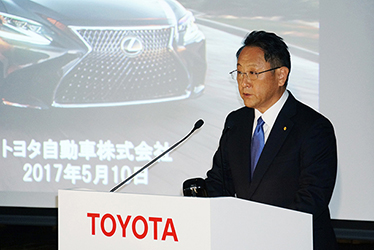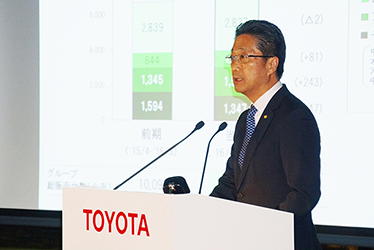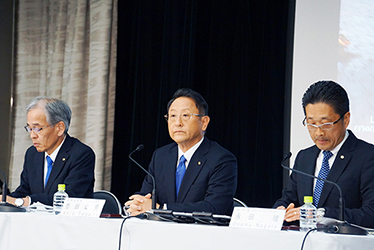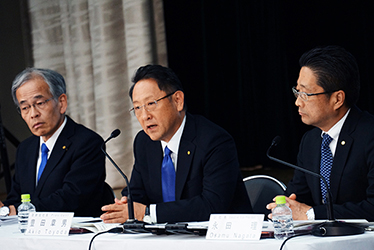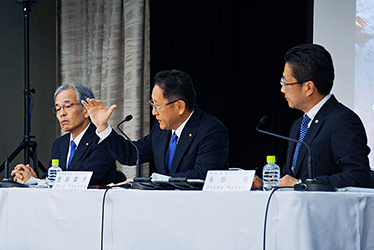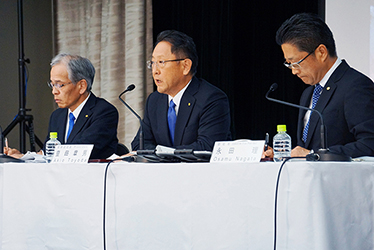May. 10, 2017
Financial Results for the Fiscal Year Ended March 2017:
Prepared Remarks by President Akio Toyoda
Good afternoon everyone, and thank you all very much for taking the time to join us today.
Looking back on the fiscal year that ended on March 31, we achieved operating income of 1 trillion 994.3 billion yen, due to concerted group-wide cost-reduction efforts, coupled with all-out sales efforts in each country and region.
I would like to take this opportunity to thank each and every one of our customers around the world for choosing us. We are, again, also extremely grateful to our dealers, suppliers and all our stakeholders for their invaluable support.
We have decided to set the year-end dividend for our common stock shareholders at 110 yen per share. As a result, the total annual dividend will be 210 yen per share, including the interim dividend of 100 yen per share. We also plan to implement a new share buyback up to a maximum of 250 billion yen, or an upper limit of 50 million shares.
We aim at continuously improving our corporate value for our shareholders to make them feel rewarded for their long-term investment in Toyota.
Concerning our financial results, I would like to briefly talk about my philosophy.
Our desire is to contribute to the world and to people by enriching society through monozukuri (manufacturing). To this end, we have aimed to make our company, itself, one capable of sustainable growth, regardless of the circumstances.
I have said that we have entered the implementation phase of sustainable growth by pursuing our three main goals of making ever-better cars and developing people, which we improved during our intentional pause, taking up challenges for the future and reinforcing our management and financial foundation.
While there is no doubt that we need to continue these activities going forward, I feel that the outlook of our earnings for the current fiscal year, with neither the positive nor negative impact of foreign exchange rates, honestly present the current strength of our true selves.
When it comes to making ever-better cars, our challenge of making cars in a completely new way by introducing TNGA (Toyota New Global Architecture) has manifested in the new Prius PHV and the C-HR new compact SUV, meaning we are now able to deliver TNGA-based vehicles to our customers.
I realize now that, through TNGA, our efforts to make ever-better cars have started to take root as an unshakable axis that penetrates our technological development, production engineering and production sites.
Until now, there were times when Toyota's cars were called "boring" or were said to be lacking in character. But I now feel that, in terms of driving and design, our customers have begun to favorably evaluate our cars.
On the other hand, when it comes to making ever-better cars in a smart way, it is becoming apparent that there is still room for improvement.
For example, might it not be the case that an over-enthusiastic desire to make ever-better cars is putting priority on improving our competitiveness in terms of performance and quality, while leaving issues of cost and lead time for later?
Or, is the way we work capable of thoroughly implementing the basic principle of "appropriate sales price minus appropriate profit equals ideal cost"?
In other words, I feel a strong sense of crisis about whether or not we are actually executing car-making from the perspective of the customer in all Toyota workplaces―from development, production, procurement and sales, all the way to administrative divisions.
I believe that making ever-better cars starts with compact cars.
To provide the fun and freedom of mobility to as many people as possible, compact cars, even if they are small, must be safe and comfortable. Even if they have small engines, they must provide stress-free driving performance. And, precisely because they are compact cars, they must―most-importantly―accomplish such while still being affordable.
In the in-house company system we introduced last year, we launched the Toyota Compact Car Company, which specializes in compact cars, made Daihatsu a wholly owned subsidiary, and established a compact car company for emerging markets, among other actions. These we have done with an aim toward returning to the basics of car-making for compact cars.
Our in-house companies responsible for compact cars will benchmark each other and learn smarter ways of making such cars.
Furthermore, with these in-house companies competing and such with our in-house companies responsible for larger vehicles, the in-house companies will improve by learning from each other. Through this, I want to make Toyota's car-making simpler and more low-cost.
It is my view that our latest financial results demonstrate Toyota's desire to steadily and continuously advance our investment in the future, rather than place top priority on short-term profit.
The present automobile industry is being asked to make a paradigm shift, for which, as I see it, especially AI, autonomous driving, robotics, connected systems and other new domains will hold important keys.
It is exactly because such an age is upon us that I believe it is necessary to cultivate a company that has the technological capabilities and the will to create the future, and it is why we established TRI (Toyota Research Institute) in January last year. I want to continue planting seeds with a look to 10 or even 20 years into the future.
We are not the only ones planting such seeds, as various players in other industries, such as IT, are also doing so, as well as are car manufacturers in emerging markets, among others. Not only cars, but the future automobile industry, as well, might evolve into a world that is completely different from that up until now.
I want cars to be loved by everyone around the world. For cars to be loved, while innovations in software will play an important role, I believe that even more important is combining such with the hardware that we have refined over many years to create a car that can become a customer's cherished partner and one that is invaluable.
For smiles on our customers' faces, approaching both software and hardware from all directions is Toyota's way. That is because it is our responsibility to deliver safety and peace of mind to all people.
Although we still have a long way to go, I believe our company is transforming into one strongly resolved to changing today for tomorrow, that takes risks and is willing to take it upon itself to open the way forward.
We have strengthened our financial foundation and are ready to invest steadily under all circumstances.
I want us to put everything we have day by day into cultivating the seeds we have thus far planted, so that our accumulated efforts will allow us to achieve competitiveness that will enable us to survive in the future.
Finally, if I may briefly mention my feelings about the current fiscal year, I want this year to be one in which we do everything we can to take a critical look at our true selves and strive to improve our competitiveness.
For this, it is important that we steadfastly advance our investment in the future, as well as advance both making ever-better cars and smart car-making, which are inseparable.
The biggest concern for management is, more than there being an issue, not knowing whether there is an issue or not and, if there is, not knowing its severity.
Such as by introducing an in-house company system and creating alliances, we have continued to innovate to encourage management and our workplaces to bring problems to light and make improvements.
We must take a sincere look at what we have accomplished and what we have yet to accomplish. Based on this, we will continue to make progress in staying on track with our goal to achieve sustainable growth.
Thank you in advance for your continued understanding and support.





